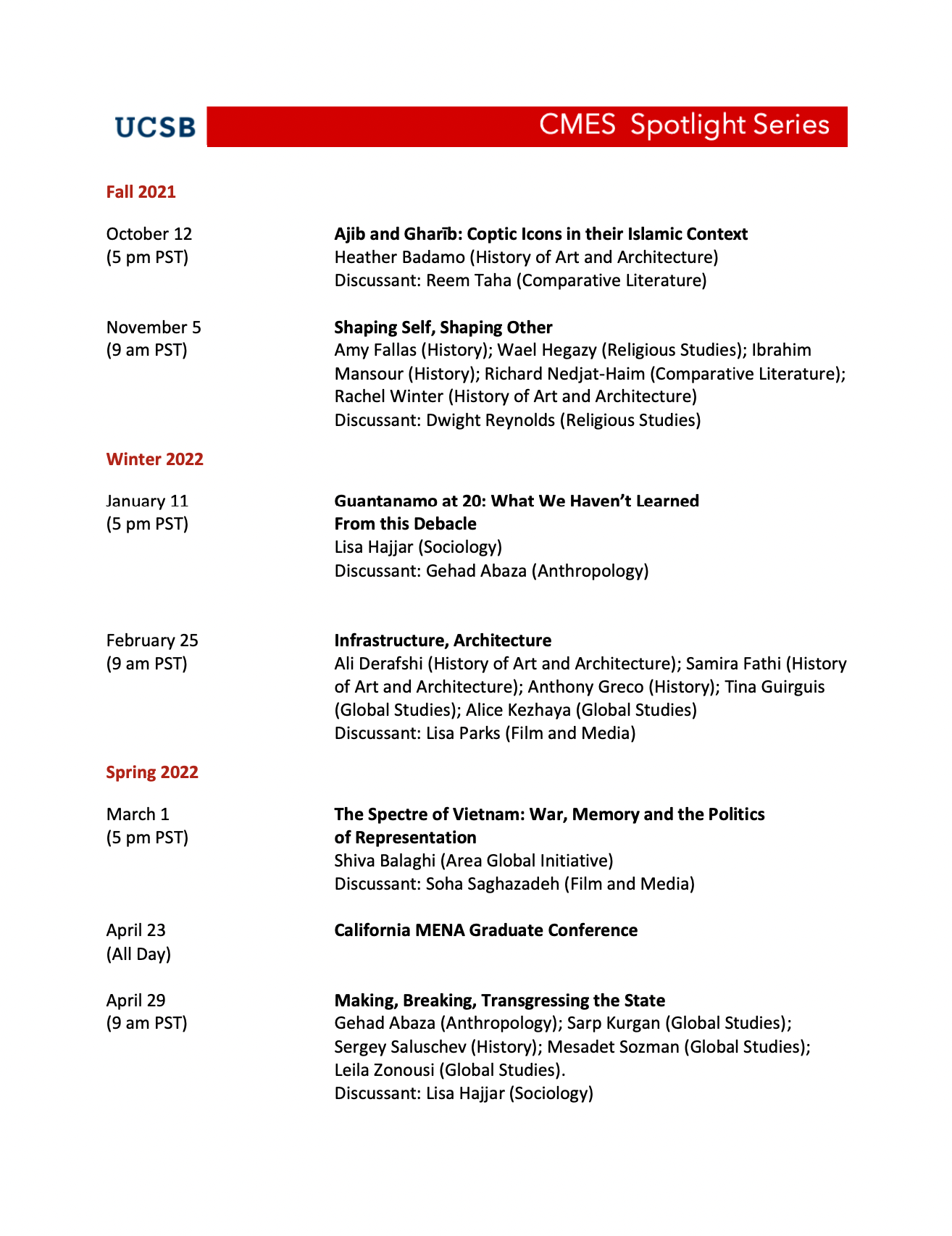Founded in 1990, the Center for Middle East Studies (CMES) promotes the study of the Middle East, North Africa, and Islam at the University of California, Santa Barbara. CMES has long been a bastion of interdisciplinary scholarship, collectivity, and exchange. The last decade has witnessed a flourishing of CMES faculty and graduate students at UCSB across disciplines (Humanities, Social Sciences, and Sciences) and methodology (archival, ethnographic, quantitative, qualitative). CMES curates events geared to the campus academic community and broader public, including conferences, film series, musical performances, lectures, and book talks. It supports graduate studies of the Middle East, North Africa, and Islam through funding, conferences, symposia, and workshops.
This year we embark on a series of events and programs that highlight the rich scholarship and research of UCSB’s faculty and students. The scholarly production and general wellbeing of graduate students is a priority at CMES. The Middle East and North Africa is a global place, it is a place that produces people, movements, theories, knowledges, and practices. It is place that can give us the tools to navigate our global precarity. CMES will embody and support this globality by building organically from the ground up, by investing in our rich human resources, and by offering a space to produce critical, grounded, innovative scholarship.
Mark your calendars for our year long “CMES Spotlight Series,” details attached, as we feature the innovative research of the faculty and students that constitute our rich scholarly community across departments, initiatives, and programs at UCSB.
Event List
12 October (5:00 PM PST)
Heather Badamo (History of Art and Architecture) Discussant: Reem Taha (Comparative Literature)
5 November (9:00 AM PST)
Shaping Self, Shaping Other
Amy Fallas (History); Wael Hegazy (Religious Studies); Ibrahim Mansour (History); Richard Nedjat-Haim (Comparative Literature); Rachel Winter (History of Art and Architecture)
Discussant: Dwight Reynolds (Religious Studies)
11 January (5:00 PM PST)
Guantanamo at 20: What We Haven’t Learned From this Debacle
Lisa Hajjar (Sociology)
Discussant: Gehad Abaza (Anthropology)
25 February (9:00 AM PST)
Infrastructure, Architecture
Ali Derafshi (History of Art and Architecture); Samira Fathi (History of Art and Architecture); Anthony Greco (History); Tina Guirguis (Global Studies); Alice Kezhaya (Global Studies)
Discussant: Lisa Parks (Film and Media)
1 March (5:00 PM PST)
The Spectre of Vietnam: War, Memory and the Politics of Representation
Shiva Balaghi (Area Global Initiative)
Discussant: Soha Saghazadeh (Film and Media)
23 April (All Day)
California MENA Graduate Conference
29 April (9 AM PST)
Making, Breaking, Transgressing the State
Gehad Abaza (Anthropology); Sarp Kurgan (Global Studies); Sergey Saluschev (History); Mesadet Sozman (Global Studies); Leila Zonousi (Global Studies).
Discussant: Lisa Hajjar (Sociology)
